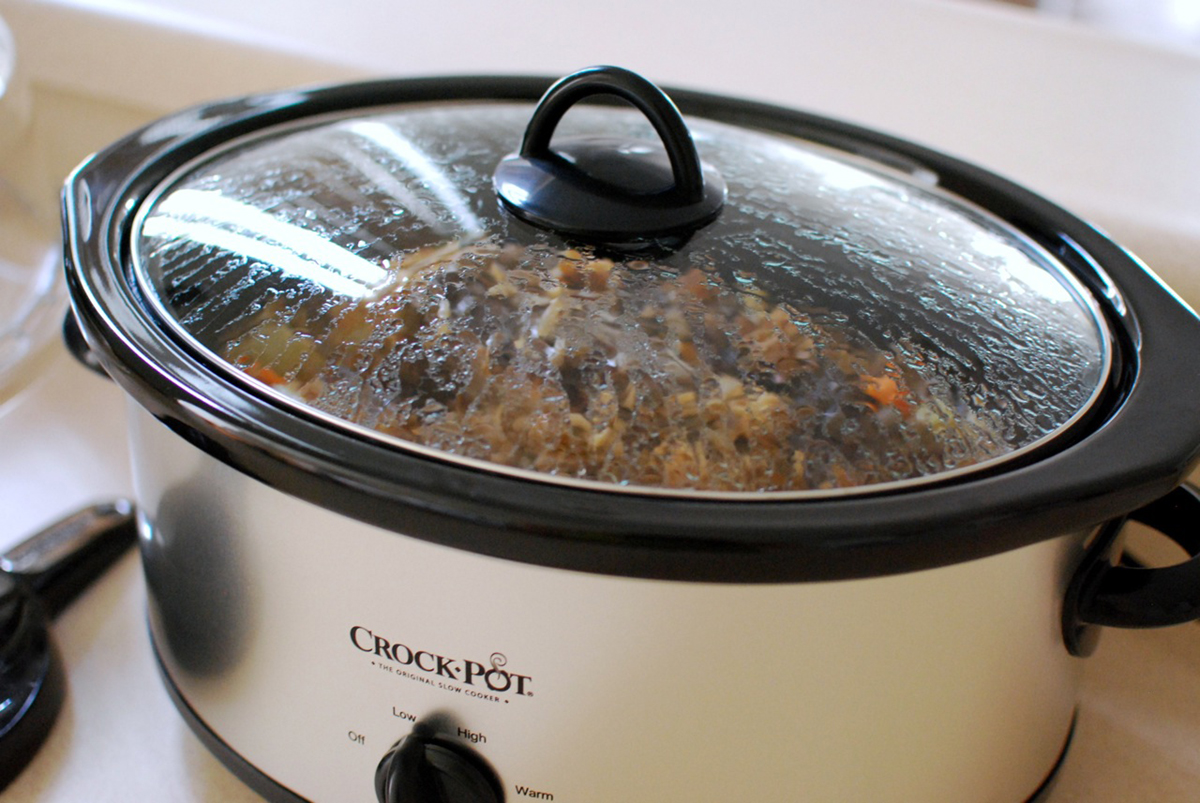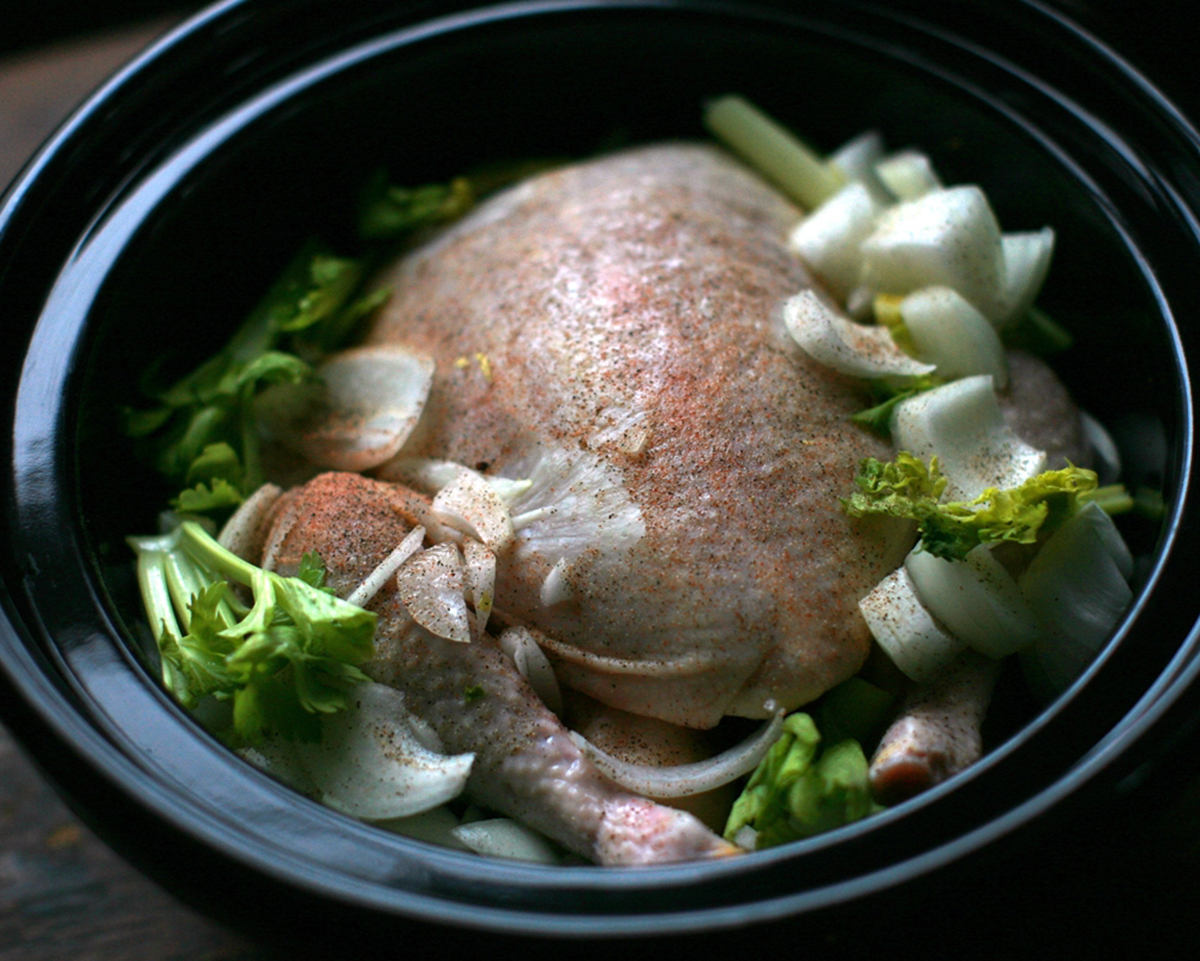Are you a busy professional trapped in a fast-food routine because you're simply too tired (and, perhaps, too hungry) to prepare home-cooked meals after work? Do you have a young family and think you have better things to do with your time than to spend hours in the kitchen?
Anyone who has ever had a great home-made family meal knows that few things as are satisfying and healthy as real meals made from scratch, yet it's also painfully clear that not everyone has the time to make them. So what can you do? Slow cookers first appeared in the 1970s, as increasing numbers of women found work outside of the home and no longer had time to hang out in the kitchen. They're now re-emerging and loved among people who want decent and nutritious meals without putting in the effort. Would you benefit from a slow cooker, and what exactly can you do with it?

What Is A Slow Cooker?
A slow cooker is a counter-top electric kitchen appliance that's sometimes known as a Crock-Pot, though the latter is actually a trademark. Slow cookers are usually round or oval in shape, and many look an awful lot like a regular saucepan. Slow cookers have a metal outer shell and heating component, and an inner dish that is usually made of ceramic or porcelain. As the name suggests, a slow cooker cooks foods slowly, at relatively low temperatures that preserve both flavors and vitamins.
Slow cookers come with three heat settings: high, low and keep warm. The actual temperatures involved vary a little from machine to machine, but the high setting is designed to prepare a meal in about four hours, while the low setting takes a bit longer: roughly eight hours. That sounds like a long time, doesn't it? What this means is that you can prepare your ingredients before heading off to work and come home to a fully prepared hot meal. You can also start your meal off in the evening and have, for instance, oatmeal with fruits waiting for you in the morning. The keep warm setting is designed to keep your already finished meals warm.
I got my slow cooker only about a month ago. I'm a busy, single and middle-aged professional woman. I am out of the house rather a lot. As a vegetarian who loves healthy meals, the easy and not so healthy dinner habit I had fallen into was frustrating. I opted for quick meals, and both flavor and nutrition took a back seat. I knew something had to change. Then, one day, a friend with a large family invited me over for dinner. The flavors floating around her house were amazing, so I had to ask her what was cooking. The answer came in the form of a charming saucepan-like device sitting elegantly on her kitchen counter: a slow cooker. I ordered one on the internet when I came home — way past midnight — that very night. I haven't regretted it one moment, and I think you'll feel the same.
READ How to Cook Leftovers and Make Them Taste Great
Still not convinced? Check out the reasons to get a slow cooker on the next page.
Why You Should Get A Slow Cooker
Slow Cookers Are Foodie-Friendly
As a vegetarian, I can tell you absolutely nothing about preparing meat in a slow cooker, other than that it's very possible. For something that looks so humble, however, slow cookers are extremely versatile. You can prepare stews, casseroles, soups, and curries in your slow cooker — but, wait for it, you can even go for home-made yogurt (you'll need a starter), cakes, pasta sauces, and lasagna.
The flavors a slow cooker produces are absolutely amazing. The lid traps all the good tastes inside, giving you a meal that tantilizes the taste buds, much more than a stir-fry or boiled meal ever could. When you first get a slow cooker, a world of new recipes you've never explored opens up to you. If you've been stuck in a food rut, it will now end. Trust me.

Slow Cookers Are Frugal And Environmentally Friendly
Purchasing a slow cooker will set you back between $30 and $150, if you don't get something very fancy. Once you have got one, running it takes up the energy of about two normal lightbulbs. They are much more energy efficient than stoves and ovens, helping you save money and the environment at the same time. What's more, you'll have a meal for several days if you're single.
Slow Cookers Give You Healthy Meals
The lower temperatures and closed system provided by a slow cooker prevent the loss of nutrients that comes with other forms of cooking. Relying on low temperatures and small amounts of water to prepare meals, slow cooker recipes do not call for large amounts of oil or fat at all. In short, slow cookers give you healthy meals.
Cooking And Cleaning Up Are Both Effortless
Yes, you do, clearly, have to chop up your veggies and prepare whatever other ingredients your recipe uses ahead of time. Once that is done, however, slow cooker meals require no effort at all. Isn't it amazing to think that you can turn on your slow cooker in the morning, and that your very own mechanical cook works away for you all day, completely safely, while you doing other things? When you come home, all you have to do is dish out some food, eat, and relax. A slow cooker's inner vessel and lid can indeed go in the dishwasher if you have one. I don't, but washing up a lid and vessel, a plate, and a knife and fork is so much easier than washing up a saucepan, frying pan, and cleaning the stove afterwards. What's more, if you have left-overs, which being single I do, you can put the inner vessel with your food straight in the fridge once it has cooled down. Microwave the whole thing the next day, and Bob's your uncle!
READ What Do Nutritionists Eat When They Eat in Restaurants?
Slow cookers save you an awful lot of time and add variety to your life. I love mine, and I am sure you'd love one too!
- Photo courtesy of ninacoco via Flickr: www.flickr.com/photos/geishabot/4312748848
- Photo courtesy of ninacoco via Flickr: www.flickr.com/photos/geishabot/4312748848
- Photo courtesy of PHOTO/arts Magazine via Flickr: www.flickr.com/photos/chpaquette/2192399729


Your thoughts on this